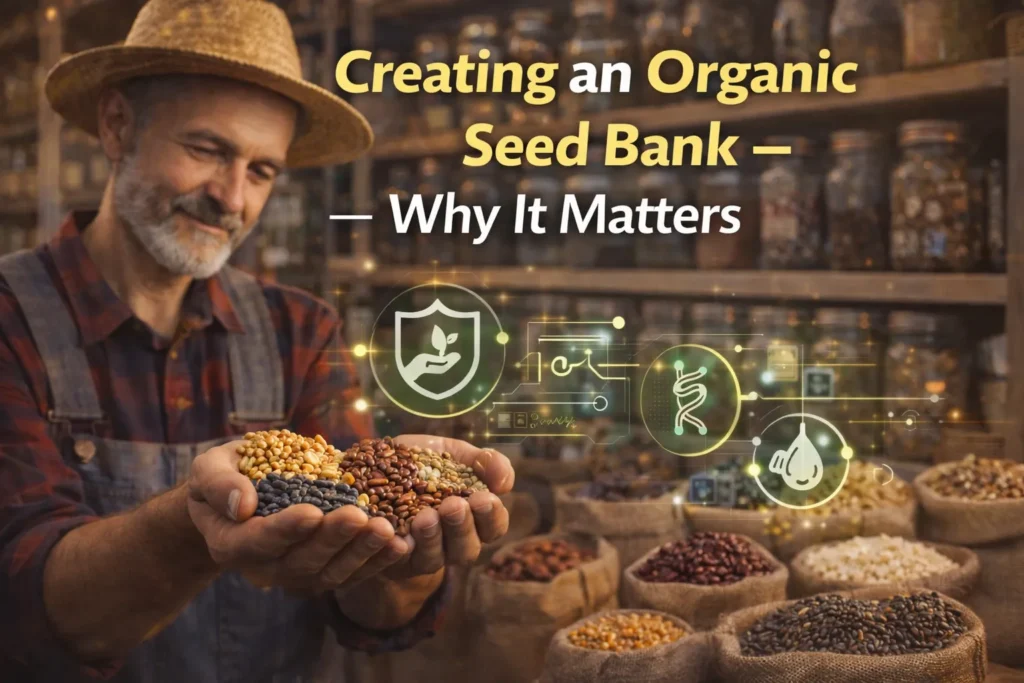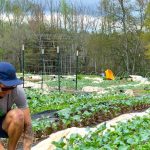Imagine having the power to preserve nature’s bounty right at your fingertips. This is what creating an organic seed bank offers you.
It’s not just about storing seeds; it’s about safeguarding biodiversity and ensuring your garden thrives with healthy, resilient plants. You might wonder why this matters. Well, having your own organic seed bank means you can grow crops that are perfectly suited to your local environment, saving you money and giving you peace of mind.
But it doesn’t stop there. By preserving seeds, you contribute to the fight against climate change and support sustainable agriculture. Are you ready to discover how this simple step can make a big difference in your life and the world around you? Let’s explore why creating an organic seed bank is a must for every conscious gardener.

Importance Of Organic Seed Banks
Preserving biodiversity through organic seed banks ensures access to naturally resilient crops. These banks safeguard heritage seeds, maintaining agricultural diversity. They promote sustainable farming practices, reducing dependency on chemical treatments, and fostering healthier ecosystems.
Creating an organic seed bank is like nurturing a treasure chest of biodiversity. It’s not just about storing seeds; it’s about preserving the very essence of life itself. The importance of organic seed banks lies in their ability to safeguard the future of agriculture and ensure food security for generations to come. Imagine having the power to protect rare and heirloom varieties that might otherwise vanish forever.
Every time you plant a seed from an organic seed bank, you’re sowing hope for a healthier planet. But why does this matter so much?
Preserving Genetic Diversity
Organic seed banks play a crucial role in preserving genetic diversity. They store seeds from various plant species, including those that are rare or endangered. This diversity is vital for resilience against pests, diseases, and changing climate conditions.
Think about it: with a wide range of genetic traits, plants can adapt and thrive even in challenging environments. By supporting organic seed banks, you’re contributing to a robust and diverse agricultural ecosystem.
Ensuring Food Security
Food security is a pressing issue, and organic seed banks are part of the solution. They provide farmers with access to seeds that are not genetically modified and have been grown without synthetic fertilizers or pesticides. This means healthier crops and safer food on your table.
Consider how important it is to have reliable access to nutritious food. Organic seed banks make this possible by offering seeds that produce high-quality crops naturally.
Supporting Sustainable Agriculture
Organic seed banks promote sustainable agricultural practices. They encourage the use of seeds that thrive without harmful chemicals. This supports soil health and reduces environmental impact.
Picture a farm where plants grow naturally and harmoniously with the environment. That’s the promise of organic seed banks. By choosing seeds from these banks, you’re advocating for farming methods that respect and protect our planet.
Empowering Local Communities
Organic seed banks empower local communities by providing them with resources to grow their own food. This reduces dependency on commercial seeds and fosters self-sufficiency.
Imagine the joy of harvesting crops that you grew from seeds passed down through generations. It’s not just food; it’s a connection to your heritage and community. Organic seed banks offer this empowerment and freedom.
Questions To Ponder
Have you ever considered the impact of the seeds you plant? Are they nurturing the earth or depleting it? How can you contribute to the preservation of biodiversity through your choices?
Organic seed banks offer you a chance to make a difference. By supporting them, you’re taking a stand for a healthier, more sustainable future. So, what’s stopping you from becoming a guardian of seeds?
Steps To Establish A Seed Bank
Creating an organic seed bank is crucial for preserving plant diversity. It ensures future generations can enjoy a variety of crops. Establishing a seed bank involves several key steps. These steps help maintain a healthy and sustainable ecosystem.
1. Choose a Suitable Location
Select a location that offers stable temperature and humidity. Seeds require specific conditions to remain viable. Avoid areas prone to flooding or extreme weather.
2. Gather Organic Seeds
Collect seeds from organic sources to ensure purity. Organic seeds are free from chemicals and genetic modifications. This step is vital for preserving natural plant traits.
3. Prepare Storage Containers
Use airtight containers for storing seeds. Containers protect seeds from moisture and pests. Label each container with seed type and collection date.
4. Catalog Seed Information
Maintain detailed records of each seed variety. Include growth habits, harvest times, and any special care instructions. Cataloging helps future growers understand seed characteristics.
5. Monitor Seed Health
Regularly check seeds for signs of decay or pests. Healthy seeds are essential for successful planting. Remove any damaged seeds to prevent contamination.
6. Engage the Community
Involve local communities in seed bank activities. Community participation fosters awareness and education. It strengthens commitment to biodiversity and sustainability.
Challenges In Seed Conservation
Seed conservation faces several challenges that threaten biodiversity. These challenges impact the success of organic seed banks. Understanding these issues helps in effective seed preservation strategies.
Climate Change Impact
Climate change alters growing conditions. This affects seed viability. Temperature fluctuations can reduce germination rates. Droughts and floods also threaten seed preservation efforts.
Loss Of Habitat
Urbanization leads to habitat loss. Many plant species lose their natural environments. This makes collecting seeds harder. Fewer seeds mean fewer options for conservation.
Genetic Erosion
Monoculture farming reduces genetic diversity. Diverse plant varieties disappear over time. This erosion limits the genetic pool. It poses a risk to global food security.
Pests And Diseases
Seeds face threats from pests and diseases. Invasive species can destroy seed stocks. Disease outbreaks can wipe out entire seed collections. These threats require constant monitoring.
Funding And Resources
Seed banks need resources to operate. Funding shortages hinder conservation efforts. Limited resources restrict research and development. This affects the sustainability of seed banks.
Technical Expertise
Seed conservation requires specialized knowledge. Few experts are available for training. Lack of expertise impacts seed bank operations. It limits the ability to store and preserve seeds effectively.
Legal And Policy Issues
Regulations affect seed collection and sharing. Different countries have varied laws. Navigating these regulations can be complex. It poses challenges for international seed exchange.
Understanding these challenges helps in creating effective strategies. These strategies ensure successful seed conservation and biodiversity protection.

Benefits For Future Generations
Building an organic seed bank safeguards biodiversity and ensures food security. Future generations will benefit from diverse crop options. Healthy ecosystems and sustainable farming practices become possible with preserved seeds.
Creating an organic seed bank is more than just a hobby for avid gardeners. It’s a valuable investment in the future of our planet. The benefits it offers to future generations are numerous and profound. Preserving seeds today can ensure the survival and prosperity of your children and grandchildren. You might not see the immediate impact, but your actions today can sow the seeds of tomorrow’s harvests.
Preservation Of Biodiversity
By saving a wide variety of seeds, you help maintain biodiversity. This means future generations will have access to a rich array of plant species. A diverse gene pool can provide resilience against pests and diseases. Imagine your grandchildren enjoying fruits and vegetables that you preserved today.
Ensuring Food Security
Creating a seed bank ensures that future generations have access to a sustainable food supply. With climate change impacting agriculture, having a diverse range of seeds becomes crucial. These seeds can be adapted to changing environments, ensuring reliable crops. Your small effort today can lead to food security for tomorrow.
Passing Down Traditions And Knowledge
Saving seeds isn’t just about plants. It’s about preserving traditions and knowledge. When you save seeds, you also pass down valuable gardening skills. This knowledge can empower future generations to cultivate their own food. Sharing stories about how you grew and cared for these seeds can also build a deeper connection with your family.
Environmental Benefits
Organic seeds contribute to healthier ecosystems. They promote sustainable agriculture, which reduces the need for chemical fertilizers and pesticides. This can lead to healthier soil and cleaner water for future generations. Consider how your actions can lead to a healthier planet for those who come after you.
Economic Resilience
By saving seeds, you help future generations become less dependent on commercial seed companies. This can provide financial savings and economic stability. Imagine your descendants having the freedom to grow their own food without financial burdens. Your efforts today can empower them with economic resilience.
Creating an organic seed bank is an investment in the future. Each seed you save is a small, but significant, step towards a sustainable world. What legacy do you want to leave for future generations? Your actions today can shape a better tomorrow.

Conclusion
Creating an organic seed bank holds great importance for our future. It ensures diverse crops and food security. Protecting seeds means preserving our heritage and biodiversity. Each seed saved is a step toward sustainable agriculture. Organic seeds adapt better to local conditions.
This boosts resilience against pests and diseases. By storing seeds, we safeguard against climate change impacts. Everyone can play a part in this vital initiative. Start small and contribute to global efforts. Let’s nurture the earth and our future generations.
A seed bank isn’t just storage. It’s a promise for a greener tomorrow.



